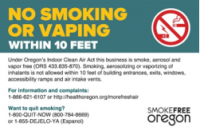Environmental Health
Our environment greatly influences the health of our community. The Crook County Environmental Health Program is responsible for mitigating and limiting the spread of disease by making sure places where people eat, drink, play, live and work are safe from preventable and harmful environmental hazards.
Environmental health is responsible for monitoring food establishments, water systems, and infrastructure. On this page you will find:
- Documents, forms, and licensure
- License Facility Information
- Drinking-Water Program
- Environmental Health Hazards
- Home-Base Kitchens
- Contact us
Documents, forms, and licensure
Food Handlers Card
All food service workers are required to have a Food Handlers Card:
- Oregon law requires food handlers cards to be obtained within 30 days of beginning work
- The food handler card costs 10.00 dollars and is valid for three years.
- If you received a food handler card from another state it is not valid in Oregon
- Food handler cards can transfer from county to county in Oregon
If you lost your food handler card and need to replace it you will need to contact the agency that issued your card.
Temporary Food License
A restaurant or foodservice is considered temporary when they are operating and preparing food at an event and will be served for public consumption. Examples include fairs, carnivals, festivals, concerts, or any public gathering. In order to operate a temporary food establishment you must have a temporary restaurant license. For more information about temporary food licensing laws, regulation, and guidance on safety and sanitation hazards see the TEMPORARY RESTAURANT OPERATION GUIDE by the Oregon Health Authority.
- 1 Day event = $65
- 2 or more days = $70
- 30 or 90 day events = $120
If you are caught without a license instant removal of the operation will occur and possible monetary fine(s). You can obtain an application here or from the environmental health specialist, located at 300 NE 3rd St # 12, Prineville, OR 97754. Application and fees must be completed prior to opening the temporary establishment.
License Facility Information
The environmental health specialist is responsible for inspecting all facilities that provide services, whether it is food, lodging, or recreational, is licensed and inspected.
Laws, regulations and licensing information can be found here:
Food services
- Food Sanitation Rules
- Food Service Plan Review Application
- Food Service License Application: Restaurant/Bed and Breakfast
- Mobile Food Unite Plan Review Packet
- Food Service License Application: Mobile Food Unit, Commissary, Warehouse, Vending Machine
- Mobile Food Unit Operation Guide
Inspection Scores
Restaurants and mobile food trucks are inspected when they are first established and then twice a year. The inspections are conducted by the Environmental Health Specialist. Inspections are unannounced and are a tool used to prevent the spread of disease and injury.
For inspection scores visit HealthSpace
Mass Gatherings - Must go to community development
Lodging facilities & RV Parks
- Travelers’ Accommodation Rules
- Tourist Facility License Application
- Recreational Parks
- RV Toilet to Space Ratio
Pools
Drinking Water Program
Globally, individuals require about 20 to 50 liters of clean and safe water in order to drink, cook, and keep clean. Do you know who is responsible for keeping your water clean and safe?
- Regulated Public Water System: A water system that has 4 or more connections
- State Regulated, Non-EPA: A water system with 4 to 14 connections (less stringent water testing)
- Transient Non-Community: Schools (any number of connections)
- Non-Transient Non-Community: Campground, summer camps (any number of connections)
- Community Systems: Housing subdivisions, city water systems (15 or more connections, full spectrum of testing)
Well water safety and testing
 |
According to the Oregon Health Authority, about 23% of Oregon residence receive their water from a domestic or private well. To ensure safe well water the Oregon Domestic Well Water Program (DWSP) partners with local environmental health to improve resources that will help reduce the risks associated with private wells. |
It is recommended to test private well water once a year and testing is required during real estate sales. For common questions about well testing visit the OREGON HEALTH AUTHORITY WELL TESTING AND REGULATION site. Did you know that the rural community assistance corporation (RCAC) provides free assessments and educational resources for those who own a private well? For more information and how to apply visit the RCAC site.
For more resources and information on real estate transaction and well testing laws and accredited labs to get well water tested, visit Oregon's Domestic Well Safety Program
Environmental Health Hazards
Environmental hazards can occur year-round. The state of Oregon tracks many water and air-born environmental health hazards, but not all. It is important to understand possible hazards and how they could impact your health in order to keep yourself, family, and pets safe.
- Beach Advisory and Closure - Beaches are monitored for environmental health hazards from May to September.
- Harmful Algae Blooms - Most water bodies in Oregon are NOT MONITORED. It is important to be aware of what harmful algae bloom look like to protect yourself, your family, children, and pets.
- Air Quality - The air quality index tracks whether or not the air quality is safe or hazardous.
- Pools and Lodging Inspection reports - Local environmental health specialists are required to inspect pools and lodging facilities.
- Built Environment - The built environment includes the spaces in which we live, work, and socialize. Environmental health aims to ensure the population’s built environment is safe from toxic chemicals exposure and physical safety hazards.
Bed Bugs
| Bed bugs can be difficult to control once space has been infected. Bed bugs are known to survive on human blood but do not spread disease. However, they can interrupt our mental, physical, social, and economic health. The Oregon Health Authority has resources for getting rid of bed bugs and preventing them from getting into your home or attaching to your belongings when traveling. |  |
Bed Bug Recourses:
Home-Based Kitchens
If you are using your home kitchen to make and sell foods to the public, you may need a license from the Oregon Department of Agriculture.
Indoor Clean Air Act (ICAA)
 |
It is a basic human right to breathe clean air. Secondhand smoke and aerosol from tobacco products such as cigarettes and e-cigarettes place a health risk on the people who breathe it. To address this health risk, Oregon has an Indoor Clean Air Act (OICAA) which creates smoke-free public places and places of employment. The purpose of prohibiting smoking in public places is to not only protect people from poisons in second hand smoke, but also promotes a community where a child can grow up where the social norm is to live smoke free. Our team is available to assist businesses to comply with the OICAA which prohibits smoking and e-cigarette use inside and within 10 feet of an entrance. In addition, business owners have the right to designate their entire property as smoke free. They are not required to allow smoking on the premises for patrons or employees to further protect them from second hand smoke and promote a smoke free workplace. |
Learn more about the Indoor Clean Air Action (ICAA)
Our Work:
We work with the community to develop policies and local ordinances in Crook County to ensure all people have access to clean air.
How can I help make my community smoke free?
- Report ICAA violations
- Request for your place of employment to have a smoke free properties
- Request for your local community places where you eat/shop/play to have smoke free premises
- Promote the Quit line and other smoking cessation resources to help those around you quit; free printable materials available here
What is an ICAA Violation?
- Anyone smoking or vaping tobacco or marijuana, or carrying a lighted smoking instrument inside of a business. This includes work vehicles that are not operated exclusively by one employee, as well as hotels and motels. Certified Smoke shops are excluded from this.
- Anyone smoking or vaping tobacco or marijuana or carrying a lighted smoking instrument within 10 feet of a door, a window that opens, or the air intake vent of a business.
- Any ash receptacles located inside a business or within 10 feet of a door, a window that opens, or the air intake vent of a business.
- Outdoor tables within 10 feet of a door must be labeled as non-smoking and non-vaping. The presence of an unlawful enclosed smoking area is also a violation. Example can be found here.
How do I Report an ICAA violation?
Fill out the online complaint form or call 1-866-621-6107.
We can support your business to:
- Comply with the ICAA
- Implement and enforce a smoke free property policy in addition to the ICAA.
We can provide:
- Signage and communication materials
- Policies your business or organization can implement
- Support in answering any questions regarding ICAA
Resources:
Contact Us
Crook County Environmental Health
300 NE 3rd St.
Prineville, OR 97754
Phone: 541.447.8155
Email ENV@co.crook.or.us

